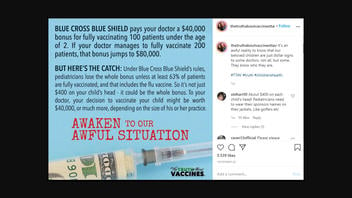
Does Blue Cross Blue Shield pay doctors a bonus based on the number of children they vaccinate? No, that's not true: An official for Blue Cross Blue Shield told Lead Stories that doctors and other providers are offered incentives based on several measures, including vaccinations, which aim to encourage best-practices in disease prevention.
The claim appeared in an Instagram post (archived here)
November 25, 2020, which opens "Blue Cross Blue Shield pays your doctor a $40,000 bonus for fully vaccinating 100 patients under the age of 2." It continued:
If your doctor manages to fully vaccinate 200 patients, that bonus jumps to $80,000.
This is what users saw on social media:
The Instagram post goes on to say:
BUT HERE'S THE CATCH: Under Blue Cross Blue Shield's rules, pediatricians lose the whole bonus unless at least 63% of patients are fully vaccinated, and that includes the flu vaccine. So it's not just $400 on your child's head - it could be the whole bonus. To your doctor, your decision to vaccinate your child might be worth $40,000, or much more, depending on the size of his or her practice.
AWAKEN TO OUR
AWFUL SITUATION
This is how a Blue Cross Blue Shield spokesman responded to Lead Stories' request about the accuracy of the dollar amounts and other figures mentioned in the Instagram post:
These payments are not tied to a single performance measure like immunizations, but overall performance across a set of metrics that support evidence based guidelines and recommendations. For pediatrics, in addition to timely vaccinations, providers are paid against performance targets that include timely well child visits, screening and treatment of common pediatric diseases, and appropriate use of antibiotics.There is no "BCBS" as the post claims but rather 36 independent companies who set their own value based contracts with local providers/physicians.
The Blue Cross Blue Shield Association's chief medical officer, Vincent Nelson, said that while it is true that most companies in the national federation of independent health insurance companies offer doctors and other providers incentives for vaccinating children, the Instagram post is mischaracterizing the intent of such incentives. He wrote in an email to Lead Stories:
Physicians/providers can be incentivized through their work with independent Blue Cross and Blue Shield companies but the implication in this post that physicians/providers pursue childhood vaccinations solely for financial reasons is false.
Lead Stories asked the national federation several times to provide either a range, average or median of the dollar amounts of such incentives doctors and providers receive across the 36 independent companies. This is the national company's response:
We're not able to share any estimates because the Blue Cross Blue Shield Association does not do any contracting with providers. Value based contracts and these incentives are decided by each independently-operated BCBS company.
A similar claim about doctors receiving incentives based on the number of vaccinations they perform was made in a March 8, 2018, article, "Incentivizing Pediatricians to Follow the CDC Vaccine Schedule" on the childrenshealthdefense.org website. The article focused on a 2016 Blue Cross Blue Shield of Michigan program. That article, like the Instagram post, has recently gone viral on social media.
In his email to Lead Stories, Nelson said that childhood immunizations make good medical sense. The Centers for Disease Control and Prevention recommends a number of vaccinations for children and adolescents.
It is medical best practice for children to receive proper, on-schedule vaccinations to ensure community protection from preventable and highly contagious diseases like measles and mumps. As part of a value-based contract, physicians/providers can be incentivized through their work with independent Blue Cross and Blue Shield companies to make sure that children obtain their medically recommended vaccinations, e.g., measles, mumps, etc. However, the implication in this post that physicians/providers pursue childhood vaccinations solely for financial reasons is false.

















